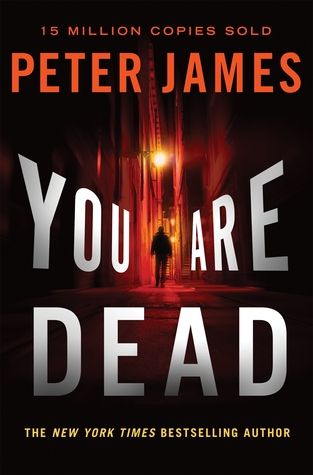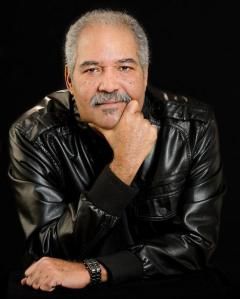Interview with British Author Peter James
Peter James is undoubtedly one of the most prolific British crime thriller authors of our modern times. As soon as I got the chance, I literally jumped at the opportunity to ask him a few questions about his famous Brighton detective Roy Grace who has captured our hearts for the last 10 years throughout the popular mystery books because reading the Peter James books in order is a real joy for any British mystery fan.
While reading his first novel, Dead Simple, several years ago (without knowing much about the author at the time), I did assume that he was an American author, and with good reason. The Roy Grace novels are fast paced, action packed, full of suspense and seat of your edge moments, traits which are not all that common to British procedurals.

I was not all that surprised when I learned that before becoming a writer, Peter James has been a film producer and screenwriter, working with American actors such as Al Pacino, Robert de Niro and many other stars.
The American ‘fast paced’ influences are all present, although Roy Grace is a very unique character, nothing much like the typical detectives featured by American writers.
The Roy Grace series, translated into over 35 languages, have sold over 17 million copies all over the world so far.
The latest book in the series is called You Are Dead, published October this year. It is the 11th Roy Grace book – and I hope there will be many more to follow!
And now let’s read what the author Peter James reveals about his research, writing process and the great fictional character he brought into this world as a gift to all of us.
Peter, welcome to Mystery Sequels. What inspired you to write the Roy Grace series and what do you like most about the detective?
Having read several of my earlier thrillers, in which I had increasing amounts of police involvement, in 2001 my publishers, Macmillan, approached me through my agent and asked if I would consider creating a new fictional detective character, with a view to writing a crime series for them.
A long time before this in 1995, I had been introduced to a young homicide Detective Inspector, Dave Gaylor. I remember entering his office at the Sussex CID HQ on the outskirts of Brighton and finding almost every inch of the work surfaces and floor covered in blue and green plastic crates, bulging with manila folders. I asked him if he was moving offices, and he replied with a sardonic smile, ‘No, these are my dead friends!’
For an instant I thought I had met a total weirdo! Then he explained to me that in addition to his duties as a current homicide detective, he had recently been tasked with re-examining all the unsolved homicides in the country, and applying the latest advances in forensics on them. ‘Each one of these crates contains the principal case file of an unsolved murder,’ he said. ‘I am the last chance each victim has for justice – and I’m the last chance their families have for closure.’
I loved that very human aspect of him, and it is a trait I’ve come to realize is common among good homicide detectives. They bond with the family of the victim and it becomes personal to them. It is part of the reason you often see a detective still pursuing a killer years after retirement.
Dave Gaylor then asked me to tell him about the current book I was working on – a psychological thriller called Denial. Halfway through he interrupted me, asking why I hadn’t thought of the police officers doing this, and that… and why my character had done one thing instead of another…. And I realised rapidly that he had a very big creative bandwidth. Again, that is a trait I’ve come to realize is common among good detectives: A homicide, like any major crime, is a huge puzzle, with hundreds and sometimes thousands of tiny pieces that have to be meticulously and painstakingly put together. But in addition to being scrupulously methodical, good homicide detective are often lateral, out-of-the-box thinkers.
Dave Gaylor and I became good friends and he helped me with many police and psychology aspects of the subsequent books I wrote. So when Macmillan asked about the series character, I went to Dave, who had by now been promoted to Detective Chief Superintendent, Head of Major Crime for Sussex, and asked him how he would feel about being a fictional cop! He loved it, and Detective Superintendent Roy Grace was born!
What do I like most about him? I think it really helps that Roy Grace is based so closely on Dave Gaylor, I feel it makes him very human.
In creating Roy Grace I thought very hard about what it is that detectives really do, and I realized that more than anything else, what they do is to solve puzzles. I thought it would be intriguing to create a detective who had a puzzle of his own that he could not solve – which is how the riddle of Roy’s missing wife, Sandy, came about. I think his inability to solve the mystery is part of what does make him so human.
I also really like Roy’s interest in the paranormal, which is in part a PJ touch (!) but in part based on reality. Many police officers will turn to the paranormal as another avenue when all else fails (this happened in Portugal in the terrible Madeleine McCann case). But also I wanted Roy Grace to be my own mouthpiece as well, for my views on all kinds of things, and I use him effectively for this!
Probably the most important thing is that I really do like Roy Grace himself and feel connected to him in a far stronger way than with any previous character. He’s like my invisible best friend! I do think that the most important thing of all in a novel are the characters. All people read novels to find out what happens to characters they get to know and like and care about.

You do a lot of research for your books. Can you talk a bit about the process that goes before a Roy Grace novel is put to paper?
My years of experience in movies has taught me that the three-act structure, which has been the backbone of drama since the time of Aristotle, is still the best starting point – although I use it slightly differently in planning my novels, it lies there beneath the surface to create three what I call “gosh-wow” moments in the story.
For instance, in my first Roy Grace novel, ‘Dead Simple’, the first “gosh-wow” is early on, when Michael is buried in the coffin and then all his friends are wiped out in the accident. The second is when Mark opens the coffin and Michael is not there. The third is when Ashley and Mark, the only people who know where Michael is, are killed in their car in the mud.
But, although I plan a book carefully, it is really the first 20% that I plan in detail, along with the ending, which I always plan, to give me a “road map” and the three high points – but after that I like events to happen spontaneously, and for the story to start to take on a life of its own – that is when, for me, the real excitement starts.
The latest book in the series, You Are Dead has been recently published. Can you talk a bit about it?
Sure! You Are Dead is my 11th Roy Grace novel. A young Brighton woman arriving home from work phones her boyfriend, to tell him she has just driven into their underground car park and can see a man acting strangely. Her boyfriend tells her to drive straight back out but before he finishes speaking she screams and the phone goes dead. He calls the police and rushes home himself – and she has vanished.
That same afternoon, workmen digging up a park in another part of the city, unearth the remains of a woman in her early twenties, who has been dead for thirty years. At first, to Roy Grace and his team, these two events seem totally unconnected. But then another young woman in Brighton goes missing – and yet another body from the past surfaces. Detective Superintendent Roy Grace has the chilling realization that there is a connection between the past and the present. Does Brighton have its first serial killer in over eighty years? A monster who has resurfaced after lying low for three decades?
In your October newsletter you mentioned that you are in the middle of researching for your next book, Love You Dead. Your loyal followers are extremely happy that the series is still going strong without any signs of slowing down. How do you see the future of the Roy Grace series?
I will continue to write Roy Grace novels as long as I’m having fun doing so and my readers want to read them!
Which writers mostly influence your work?
My biggest influences are Conan Doyle, Graham Greene and Ed McBain. I read very broadly, but in my own genre I particularly like Michael Connelley. I much prefer the US style of crime writing, which are essentially thrillers involving crimes, than the dry UK style of police procedural.
What some readers might not know is that you are literally the founding father of electronic books. Can you tell us more about how it came to be? What was the public’s reaction to it, considering that we still have a few people who would only touch a Kindle reader if their lives depended on it?
You’re quite right! In 1994 my novel ‘Host’ about a computer scientist who believes he can cheat death by downloading his brain into a computer and freezing his body became the first-ever electronic novel. In part, it was the enthusiasm of my then publishers, Penguin, who made the decision to go ahead within 4 hours of my suggesting the idea to them, but also it was the fact that I do so much research for my novels (and in particular for that novel), that I felt the electronic version gave my readers the opportunity to interact and to click and see actual photographs of places I’d visited on my research and the whole detailed background to my research.
The book was published in the traditional way, and also on 2 floppy discs. But I had no idea of the venomous backlash the publishing of Host in this way would create among the world press and among some of the older generation of authors.
I was pilloried around the world, accused of killing the novel! It is now on display in the Science Museum as the world’s first electronic novel.
 You have just had your first ghost story novel published in 20 years, with the title The House On Cold Hill. What was it like to do research for and write something so very different from the Roy Grace series?
You have just had your first ghost story novel published in 20 years, with the title The House On Cold Hill. What was it like to do research for and write something so very different from the Roy Grace series?
You could say I’d done over thirty years of research for this book…I began my career by making low budget horror movies, and I think I’ve seen just about every scary movie ever made and read every significantly scary book. I was the radio presenter on and off for two years on a late night radio phone-in show about the paranormal in Sussex and Hampshire, and I got more than a few stories then!
In 1994 the BBC gave me carte blanche to make a documentary on ghosts in Scotland. I’ve lived in two haunted houses and lived with a medium for thirteen years. I’m also the only fiction author who’s been invited to lecture at the Society of Psychical Research, so I guess that covers off my research for The House On Cold Hill!
Before you became an internationally acclaimed crime mystery author, you were also a film producer, where you had a chance to meet and work with superstars like Al Pacino, Robert De Niro, Jeremy Irons and Sharon Stone, among others. What was your experience working with these popular actors and do you have an interesting story that you remember from these times?
The problem with films is that they are such a collaborative process; it becomes almost like a committee, but up to 20 people who each believe it is their film! For example you have the screenwriter, and very often a second screen writer or “polisher”, the producer – sometimes two or even more. The executive producers, again sometimes two or more, the director, the principal actors, the director of photography, the set designer, the editor, the composer, the distributor and so on. Each and every one of these has influence on the end product. And most normally have egos the size of aircraft carriers. With a book the creative process is utterly pure. There is just myself and my agent and my editor. If I don’t want to change one single word I have written I don’t have to. I love that freedom from the “committee” process of film-making.
I also found egos of so many people involved in the movie business a nightmare. Not just actors but some directors, producers, cameramen and even wardrobe masters! One of my worst nightmares was a film we made in 1973, a rather forgettable thriller called Sunday In The Country with Ernest Borgnine and Michael J Pollard. Pollard had shot from obscurity to global superstardom in Bonnie and Clyde and had an ego the size of several aircraft carriers. I remember being called to the Hyatt hotel in the middle of the night by a manager, incandescent with rage at the noise coming from Pollard’s suite. He was partying away with, among other things, a completely stoned rooster a fan had given him, which was flying around the place, amok!
Any advice you could give aspiring crime writers? What should they do – or shouldn’t do in order to become successful?
Firstly, read, read, read the biggest selling of the kind of books you would like to write, and deconstruct them, literally dissect them, to analyze what made them work, what kept me hooked, what made me want to follow the characters. Secondly, love your characters, even the bad guys. If you think back on many of the most enduring villains in literature they have something about them that makes you care for them. Frankenstein’s Monster, telling the doctor that he did not want to exist – the doctor created him! Dracula, a monster, but charismatic and charming. Hannibal Lecter – a monster, but we like him….
I would like to thank you for the chat opportunity, and at the same time congratulate you (albeit slightly belatedly) on your recent marriage!
Thanks so much, great to chat with you!






